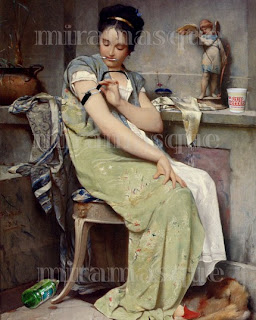“To Build a Fire” is about an unnamed man who embarks on a nine-hour trek across the Klondike’s harsh winter landscape to meet his companions at a mining camp. Against the advice of an old-timer, the man makes the journey alone, except for a dog, and as a result of a series of disasters, he freezes to death before reaching camp. The man’s behavior and his ultimate fate highlight the story’s themes of survival in the wilderness, the individual versus nature, and death. Early in the story, it becomes clear that the odds are against the man’s chances of surviving in the Klondike wilderness. He is a chechaquo, or newcomer to the region, and has never before experienced its extreme winters. Further, he is “traveling light” on foot rather than by sled and carrying only a bacon sandwich, tobacco, matches, and some birch-bark kindling. What is more, he is outdoors in temperatures well below minus fifty degrees Fahrenheit. Although he has been warned never to travel “after fifty below” without a partner who can help him in emergencies, the man’s only companion on this trek is a half-wild husky a “toil-slave” who has no affection for him. At the best of times the Klondike wilderness would seem alien to the newcomer because of its vast stretches of snow “as far as his eye could see it was unbroken white” except for the trail. As it is, the man travels with few supplies and without a partner in extreme cold. Under such conditions, it doesn’t matter that he is both quick and alert to his surroundings, for without someone to help him, his “bad luck”,which is how the man refers to his fall into the icy river and “mistake”, which is how he describes the blotting out of his second fire by snow falling from a tree become full-fledged catastrophes and destroy the man’s chances of survival. Closely related to the issue of survival in the wilderness is “To Build a Fire”’s theme of the individual versus nature. According to the story, the “trouble” with the man is that he is “without imagination” and therefore never speculates about “man’s place in the universe,” his “frailty in general,” or the fact that people are “able only to live within certain narrow limits of temperature.” Yet during his trek the man is confronted again and again by his weakness as a lone individual against the formidable power of nature in the form of the brutal cold. Each time he removes his gloves, the man is surprised at how quickly his fingers are numbed. He is also startled at how fast his nose and cheeks freeze, and he is amazed when his spittle freezes in midair before it ever hits the snow. When the man stops for lunch, his feet go numb almost as soon as he sits still, a fact that finally begins to frighten him. Even the dog who is half wild and thus closer to nature feels “depressed” by the cold. Thanks to its natural instincts and its dense winter coat, the dog survives the extreme temperature long enough to head for camp, where it knows it will find food and warmth. Without fur or instinct, the man is too frail on his own to withstand nature or “the cold of space,"as it presents itself in the Klondike: “The cold of space smote the unprotected tip of the planet, and he, being on that unprotected tip, received the full force of the blow.”Once his fire is blotted out by snow and his body is threatened by hypothermia, the man must come to terms with death. His first reaction is to acknowledge calmly that the advice given to him by the old-timer was accurate: “If he had only had a trail-mate he would have been in no danger now.” This thought occurs to him again as he fails in his effort to rebuild the fire. From there he moves to “controlled despair”; next, to apathy; and then to panic as he makes a last, futile effort to save his life by frantically running on his frozen feet in hopes of making it to camp. The man’s ultimate response to death is to try “meeting [it] with dignity.” His final words — “You were right, old hoss; you were right” are part of a conversation that he imagines having with the old-timer who had warned him not to travel alone. They are also an acknowledgment of nature’s power over the individual.

